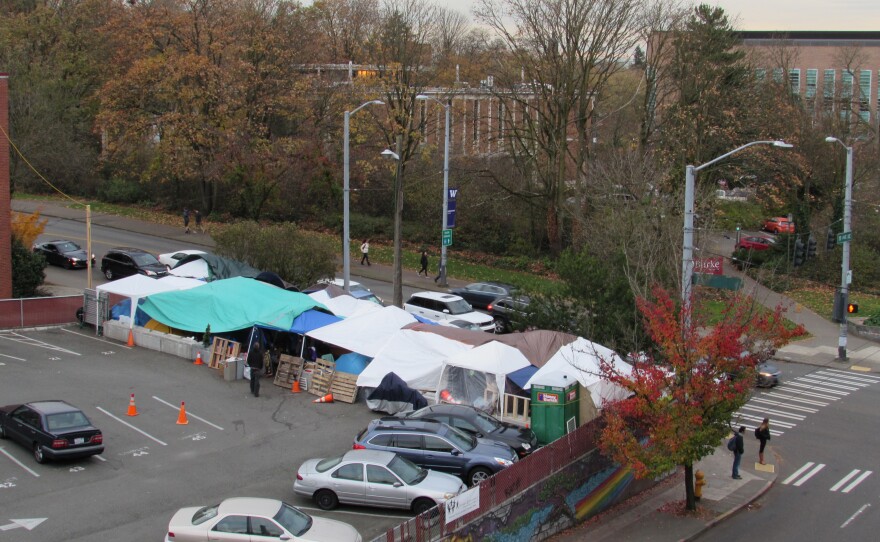The Seattle City Council has approved spending $100,000 to support homeless camps next year, like the one that sprang up on a busy sidewalk in front of the University District post office in September. That camp has since moved to the parking lot of the University Congregational United Church of Christ a few blocks away.
Twenty men, women and children now make a home out of eight parking spaces.
Every day at noon, residents of the tent village that calls itself The Ave Foundation hold a meeting to work through problems and assign chores. They call it their "family meeting."
Billy Plur was in charge of Tuesday's meeting. He ran through a list of concerns, from tarps to cleaning to supplies.
"The propane, if we can figure out a way to get some propane today," Plur said.
"I think everyone should come up with 50 cents," another resident said.
This time of year, staying warm and dry is a constant challenge.
Wooden pallets beneath flattened cardboard boxes keep tents off the wet asphalt.
Tarps hanging above the tents sag with heavy pools of rainwater. Overnight, the tarps billow and flap in the gusting winds, drowning out the traffic of busy Northeast 45th Street a few feet away.
It's the same parking lot that the tent city known as Nickelsville, which now occupies a spot in Seattle's International District, fully occupied four years ago, with up to 100 residents.
Homelessness in Seattle has increased by a third since then. On Monday, the City Council approved $2.3 million more for homeless services in 2015 than was budgeted for this year. Barring a veto by Mayor Ed Murray, Seattle will set aside $35.3 million for homeless services next year.
"If we can find poles to better prop this thing up, that would be way better," Plur said. "This canopy, we should really try to think of something to fix especially that corner right there."
It's a fragile shelter, but it's a big step up from where many homeless people find themselves each night.
The Ave Foundation camp has a Porta-Potty. A two-burner stove.
The church next door lets them use a garden hose for water.
Residents take turns doing guard duty around the clock.
There's even a warming tent with two electric space heaters inside, attached to a long extension cord running from the church.
Wilhelm Schmidt stopped by at the start of the meeting. He carried two large duffel bags and was looking for a place to stay.
Schmidt said he got kicked out of Denny Terrace, the low-income housing project where he used to live on Seattle's Capitol Hill. He also lived in a tent on Whidbey Island for a while.
In recent months, he's been living "just on the streets," he said. "I move around."
"I'm trying to get in a program of mental health that would actually put me inside and give me medication and have me have, you know, meals and everything like that," Schmidt said.
Billy Plur told Schmidt they do have an empty slot or two now since a couple residents moved out and others on the wait list seem to have disappeared. To get in, people must pass a criminal background check, attend three family meetings and sign a code of conduct: no drugs, alcohol or weapons.
"Whoever actually shows up to the meetings and shows that they actually want to be part of this and what they can give back to it and not just take from it," Plur said.
"It's a community, and in a community you have to be able to give back into it and not just take from it and just expect handouts. That's why we try to do what we can."
Mid-meeting, Schmidt shouldered his bags and walked off. "I've got to go down to the avenue and see if I can get a meal," he said.
After their Saturday meetings, The Ave Foundation's residents head out from their tents and do a neighborhood cleanup in the alleyways of the University District, often removing litter left by other homeless people.
"Not all of us are bad people and slobs," Plur said. "Some of us are actually good people and are trying to give back what we can, even though it's not as much as like, say, people who are working jobs and making money and are able to donate to places."
At least 2,300 people find themselves homeless each night in Seattle. That number, based on a one-night count in January, probably underestimates the homeless population, since many take pains to hide themselves at night from police or other prying eyes.
Seattle's tent cities provide at least partial shelter for about 150.
"It's part of our mission," said Tim Croll with the University Congregational United Church of Christ. "If Jesus was around and had a building or parking lot like ours, he'd be doing what we're doing."



